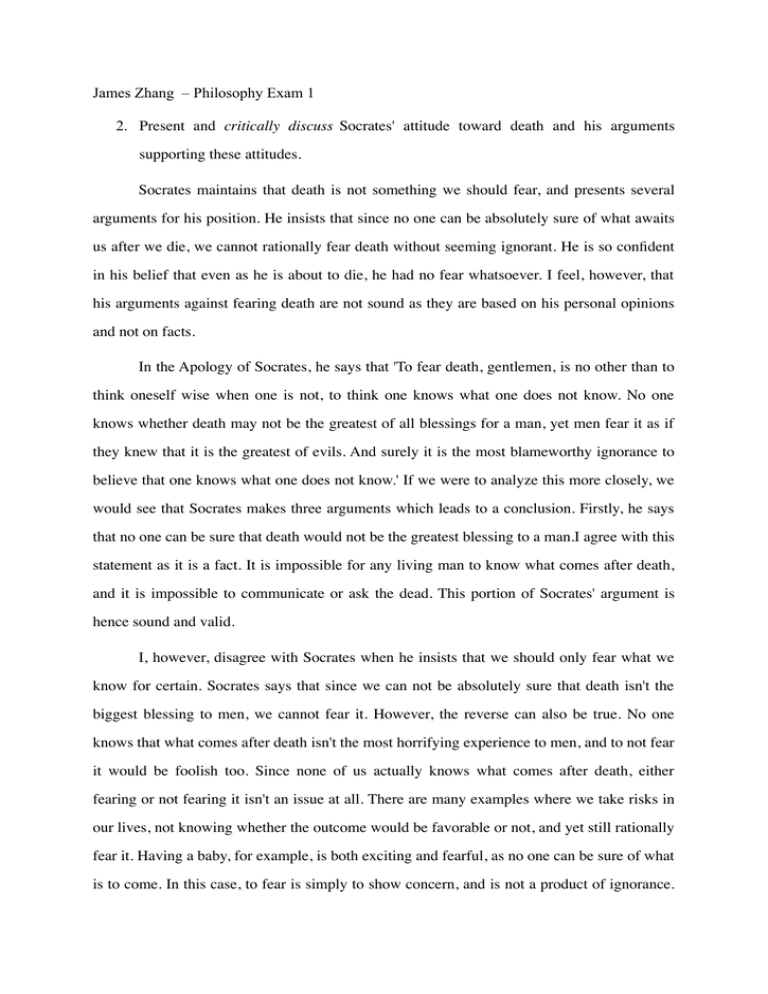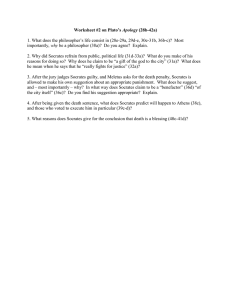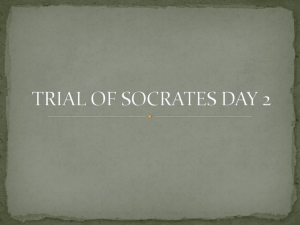James Zhang – Philosophy Exam 1 2. Present and critically discuss
advertisement

James Zhang – Philosophy Exam 1 2. Present and critically discuss Socrates' attitude toward death and his arguments supporting these attitudes. Socrates maintains that death is not something we should fear, and presents several arguments for his position. He insists that since no one can be absolutely sure of what awaits us after we die, we cannot rationally fear death without seeming ignorant. He is so confident in his belief that even as he is about to die, he had no fear whatsoever. I feel, however, that his arguments against fearing death are not sound as they are based on his personal opinions and not on facts. In the Apology of Socrates, he says that 'To fear death, gentlemen, is no other than to think oneself wise when one is not, to think one knows what one does not know. No one knows whether death may not be the greatest of all blessings for a man, yet men fear it as if they knew that it is the greatest of evils. And surely it is the most blameworthy ignorance to believe that one knows what one does not know.' If we were to analyze this more closely, we would see that Socrates makes three arguments which leads to a conclusion. Firstly, he says that no one can be sure that death would not be the greatest blessing to a man.I agree with this statement as it is a fact. It is impossible for any living man to know what comes after death, and it is impossible to communicate or ask the dead. This portion of Socrates' argument is hence sound and valid. I, however, disagree with Socrates when he insists that we should only fear what we know for certain. Socrates says that since we can not be absolutely sure that death isn't the biggest blessing to men, we cannot fear it. However, the reverse can also be true. No one knows that what comes after death isn't the most horrifying experience to men, and to not fear it would be foolish too. Since none of us actually knows what comes after death, either fearing or not fearing it isn't an issue at all. There are many examples where we take risks in our lives, not knowing whether the outcome would be favorable or not, and yet still rationally fear it. Having a baby, for example, is both exciting and fearful, as no one can be sure of what is to come. In this case, to fear is simply to show concern, and is not a product of ignorance. James Zhang – Philosophy Exam 1 Hence, Socrates' argument that we need only fear what we know for sure is unsound. He goes on to say that 'it is the most blameworthy ignorance to believe that one knows what one does not know'. If one fears death, then one is claiming to know that death isn't the greatest blessing for men, and in doing so commits the most blameworthy ignorance. I disagree with this statement, as he did not definite what the 'most blameworthy ignorance' is. No one can accurately define on a scale of ignorance what the most blameworthy one is, and everyone would have varying or different definitions of how ignorant something is. This shows us that Socrates' argument was in fact his personal opinion. If Socrates had said that it is simply ignorant to think that one knows what one does not know, I would agree with his statement. However, as he used the word 'most', this renders his argument unsound. Another argument that Socrates puts forth regarding not fearing death is that “Whether to die be evil or good, I know not, though many think they know it to be evil. But to disobey authority, human or divine, I know to be evil; and I will not do what I know to be evil to avoid what may in fact be good.” The first part of his argument says that no one knows whether death is good or evil, and I find this point to be valid. Like before, this is an irrefutable truth as it is impossible to ascertain any knowledge about the afterlife. Socrates then says that disobeying any authority is definitely evil. I do not agree with this point, as the laws set by the authorities are not agreed upon by every citizen of the state. Citizens are merely following the rules and laws set by the governing body. If the authorities or ruling bodies sets laws that are immoral, Socrates's opinion is that we still have to follow it. This makes his argument unsound, as not everyone defines evil in the same way. When Adolf Hitler, as the authority figure among Nazis, ordered the genocide of the Jews, his footsoldiers followed instructions and did not defy authority. What they did, however, was obviously evil. I hence disagree with Socrates' view that disobeying the authority is inherently evil, as his argument is based on opinion rather than absolute truths. In the third portion of his argument, Socrates says if someone knows something to be evil, we should avoid doing it. This is once again based on his opinion, as there are many James Zhang – Philosophy Exam 1 instances where people knowingly commit evil acts out of necessity. If one breaks into a grocery store during a hurricane to get some food, it is an instance of breaking-and-entering under the authority's law. This is done out of necessity to sustain his own life, but according to Socrates', this would be an act of evil. His argument against avoiding to do evil is based on his own opinion, and hence I deem it to be unsound. Socrates' arguments against fearing death were examined in this paper, and I come to the conclusion that they were not sound. Parts of his arguments are based on truths, but parts of it are based on opinion. For an argument to be sound, every part of it must be based on irrefutable truths. I suppose the downfall of his argument is that what he is trying to prove can only be based on opinion, as there is simply no measurable or quantitative way to look at death and the afterlife. To believe that one should embrace death as it might just be the greatest blessing for men is to believe in faith, and there is simply no way for anyone to prove or disprove faith.


